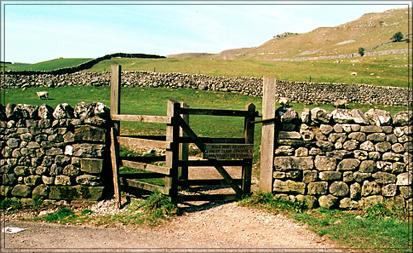Yorksview

MAY 2001
At Wetwang near Driffield in the East Riding archaeologists have unearthed the grave of a powerful Iron Age warrior queen. She lived (for less than thirty years) in the fourth century BC. As well as her remains, her grave contained her chariot which was particularly ornate and decorated with coral from the Mediterranean. Being buried in this particular way appears to be a rite exclusive to East Yorkshire though it implies links with the Champagne area of what is now France. The tribes of this area of Yorkshire became the Parisi in Julius Caesarís time. The curator of the Iron Age collection at the British Museum is quoted in the paper as saying that in prehistoric Britain local tribes were often led by powerful women. So, not much has changed in Yorkshire in two thousand four hundred years.

Kirkstall Abbey
I recently visited Barwick-in-Elmet, six miles north east of Leeds. In the chaos which followed the departure of the Romans and the invasions of the Angles and Saxons, Elmet remained an independent Romano-British kingdom until the early seventh century. Its name survives as a parliamentary constituency and in the place names Barwick-in-Elmet and Sherburn-in-Elmet. In the centre of Barwick is a ninety foot high maypole which towers over the buildings. It is taken down and re-decorated every third Easter Monday. It is a reminder of the areaís pre-Christian past. The parish church was built more recently - in the fourteenth and fifteenth centuries. Around Barwick are enormous earthworks unlike, says Arthur Mee, anything else of their kind in England. Many appear to be vast defences. Hall Tower Hill is said to have been the site of King Edwin of Northumbriaís palace in the seventh century and a meeting place of the Saxon Council. In the surrounding area are copses and woods, survivors of the forests of oak and elm which once covered the area. Barwick has big secrets. It may have been a stronghold of the Brigantes before the Roman Conquest. It probably had an important role in Elmet. It remained important after the Angles defeated the British. But its place in our history may be even more significant.
At Easter, because of the restricted access to the countryside, we and our friends decided to have our annual family walk within the City of Leeds. And fascinating it was too. We walked from Woodhouse Ridge along Meanwood Beck to the Hollies, Weetwood and West Park, the submerged villages of which Alan Bennett has written (see March Diary). We went along footpaths and in one case a bridle path that I didnít know existed. Then we passed through Beckett Park down the hill to the Aire at Kirkstall. We walked through parks and open spaces and ancient woods. We know our cities via the roads and the ribbon development along them and as a result so often are not aware of what lies behind. We had lunch at the Vesper Gate, a pub so named because it lies at what was once one of the entrances to Kirkstall Abbey. Then we followed the towpath of the Leeds-Liverpool Canal past factories and warehouses, many reborn as offices, until we reached the city centre where the canal, the Aire and the railway lines squeeze themselves into the middle of Leeds. All in all we had probably walked ten miles on a cold day on which rain and snow had threatened but never really started until we were home. Throughout the walk splashes of daffodils, blazing forsythia and showers of almond blossom had brightened our way.
Any complaints? Only the litter. Everywhere rubbish and waste thrown down or dumped. Leeds Council is able effortlessly to spend twelve hundred million pounds a year but is not prepared to keep our city properly clean. Parts of it look like the third world.
There are some things that Garry canít put on Disappearing Yorkshire. Instead they have to be experienced. Like a visit to the Rex Cinema at Elland near Halifax. My brother and his wife went there last Saturday night. Oh yes, they know how to enjoy themselves in Halifax. It is a small family-run business. A nice man warmly welcomes you when you arrive. When you go to buy your ticket the same man serves you. And there he is again selling popcorn and chocolate. At the interval he sells ice cream. He bids farewell and locks up when you leave. But the reason you should go to the Rex whilst it is still with us is that an old guy in a tweed suit and trainers enthusiastically plays an organ at the front of the auditorium before the film and again at the interval. You thought that had gone together with green jerseys on goalkeepers and bumpers on cars? Not in Elland. Anyway, he played a selection of songs from the shows then stood up, waved to his audience who responded indifferently and the lights went down. A place for collectors clearly.
| A television programme tucked away on BBC2 examined the way in which the landscape of the Limestone Dales has developed. It demonstrated that many of the field patterns and the dry stone walls can be traced back in deeds to the sixteenth century when the Dales were in fact more heavily populated than today. It showed how the economy then was based not only on farming but on lead mining and smelting too. It showed that below the present field pattern can be found an earlier one established by the Vikings after they colonised the Dales in the ninth century. Place names like Muker and Gunnerside are of Viking origin. It was fascinating to learn how little the landscape has changed in more than a thousand years. |
Dry Stone Wall |
I sometimes think the government introduces legislation just to provide more work for lawyers and inconvenience the rest of us. As if English Common Law hasnít been hugely successful in protecting our rights and freedoms, last year Parliament passed the Human Rights Act. Among the other things forbidden by the Act is, reasonably enough, forced labour. But once these things are in statute the trouble starts. Are you sitting down? No sharp instrument in your hand? An Ilkley resident has complained to Bradford Council that requiring him to push his wheelie bin (dustbin on wheels) from his house to the road each week is forced labour imposed upon him by the Council and therefore contrary to law. Legal correspondence, we are told, is taking place. I bet it is.
